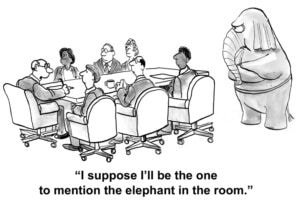Just because we lump a bunch of people together at work and call them a “team,” doesn’t make it so. A group, gaggle, bunch, or flock just requires box similarities on an org chart.
Most identified teams, simply put, aren’t.

Teams are a group of people that trust each other to do their jobs even when absent. In other words, I know you’ll do what’s best by me, even if I’m not in the room.
Teams aren’t created, they’re formed. Even better, they’re forged.
So, as the leader of this heretofore mislabeled enterprise, how do you know if you are forging this team, as opposed to just creating it? Ah, young Jedi… the perfect question.
There are a few things to look for, both good and not-so-good.
Good:
- Do team members ask questions/offer opinions (in meetings) on other team members’ responsibilities?
In other words, are they capable (and willing) to offer their opinion based on non-technical judgment or experience, in areas where they are not a subject-matter-expert? - Do team members disagree (in meetings), and then LISTEN to the responses?
Can they ask questions of each other without getting a perfunctory “jeeez,” and an eye roll from the owner of the topic?Well-intentioned devil’s advocates can sometimes be helpful. - Are most decisions made by team members OUTSIDE of team meetings?
Meetings should NOT be the place for a ton of brand-new information-sharing. It should be the place for actions and decisions that cannot be made between one or multiple members outside of a boardroom, on discussion items that have already been mostly hashed before the meeting. 
Are their routine drive-by conversations about kids, football scores and home remodeling (sorry, just can’t let that one go)? Periodic lunches, maybe even a dinner or other mostly social gatherings?
People are forever trying and tell me that outside interactions are unnecessary for a high-performing team – to that, I say bullshit. It is- Does the team keep team conflicts strictly within the team?
If I can go to your subordinate and find out what you really think of your teammates, you aren’t doing your job.The first rule of the leadership team is that you don’t talk about the leadership team outside of the leadership team. No exceptions, unless you want to say fantastically complimentary things about someone, or perhaps praise the dickens out of the teams executive and leadership coach (Oops! How’d that get in there?).
Not-so-good:
- Do team members disagree silently in meetings, then caucus with the Grand Poobah afterwards?
A sure sign of a dysfunctional team is the inability to offer contrary opinions, and the need to convince the boss outside the arena where decisions should be made, and actions agreed on.This ain’t a political primary – it’s a business and you’re a leader within it. Act like one. Have the guts to offer your opinion, even if not fully developed, where others can hear it and react. - Do team members routinely speak to you about other members’ shortcomings or challenges?
If the only way you, as team lead or senior-most leader, know that a subordinate is underperforming is for another subordinate to come and tell you… both you and that tattle-tale subordinate are key parts of the problem.If a colleague is performing sub-optimally, tell him or her directly. “Use your words,” as many parents tell their kids. Be respectful and direct, and come armed with specific examples. Ask me about our “Difficult and Courageous Conversations” for leaders. It’s a necessary skill.Or drop it and don’t mention it at all to anyone. Telling the boss first, however, is not option #3. - Do others in the organization know about specific team conflicts?
An extension of #2. When disagreements exist – when the consensus (including you) is to make Decision “A,” but you still fundamentally disagree – do you shuttle around your subordinates having “keep this between you and me” conversations with each of them about how yours is the best way?Stop that. 
They shouldn’t.There is zero reason for someone who works with you or for you to know that you think less of teammate Brian in HR than of Lynn in Operations. The organization is hurt when this occurs, since those subordinates then carry some of that baggage with them, collaborating less, sharing less, and developing unfounded heartburn for someone merely because of their tribe.And that is because of you.Don’t do that.
There’s not an absolute litmus test for high-performing and high-functioning teams, as much as a continuum. One of the highest performing exec teams I’ve ever worked with continues to “work on” being better as a team. It’s a continuous process, requiring proactive efforts by all.
The team leader sets the tone and basic non-negotiables (CPA — condone, permit, allow). All else is done by the team at large and can’t be delegated.
Other than that – easy-peasy.

